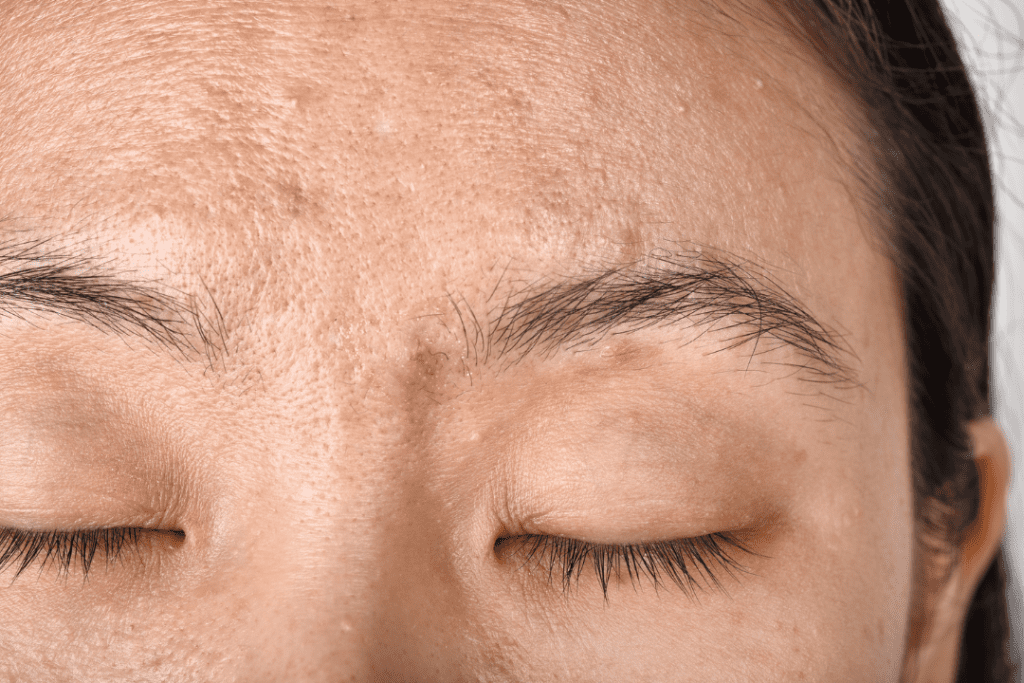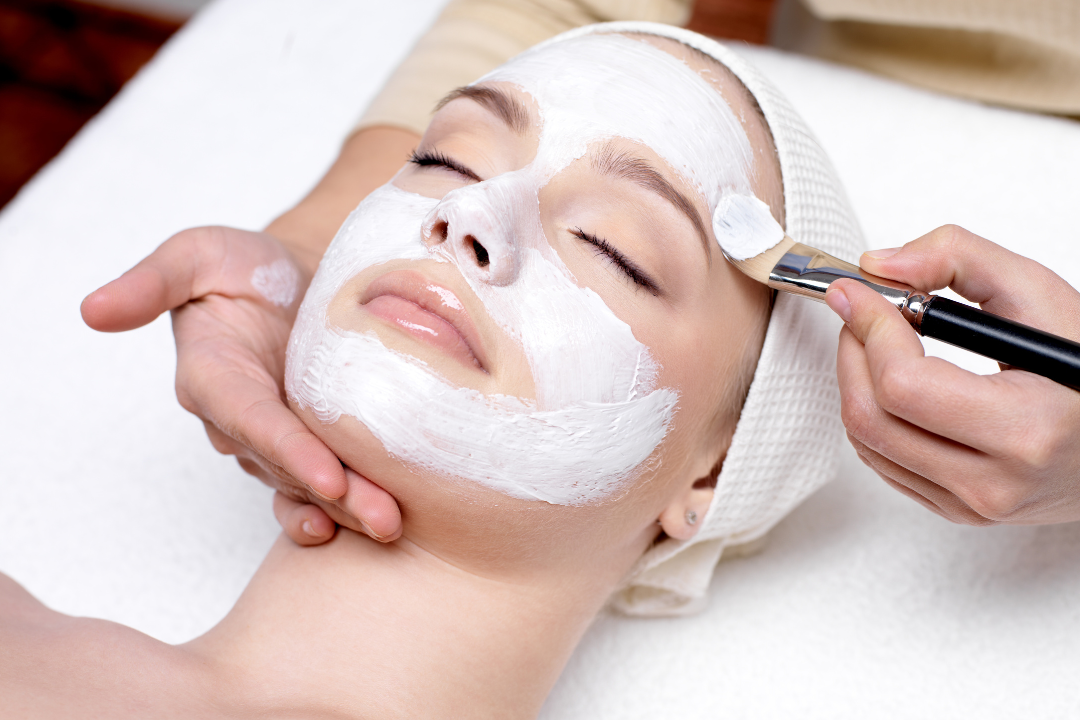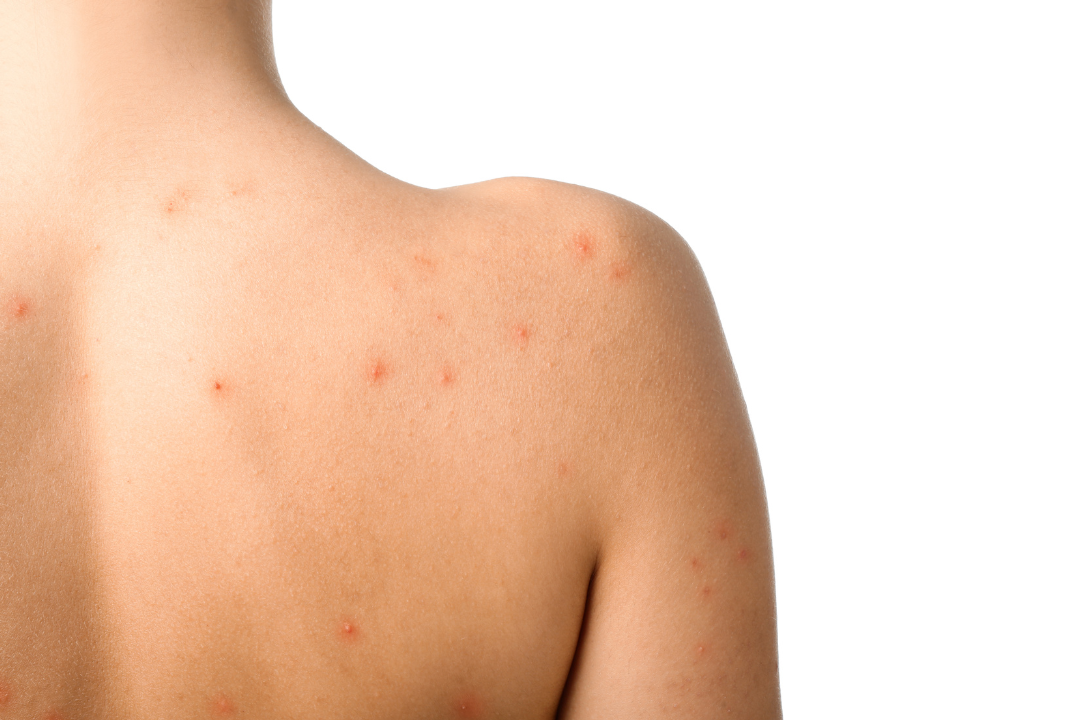Are your favorite skincare products secretly sabotaging your quest for a clear complexion?
If you have acne-prone skin, it’s key to know and avoid ingredients that clog pores. These hidden culprits could be causing your breakouts. It’s important to learn what harms your skin health. Let’s explore the best skincare products to keep your skin clear and glowing.

Key Takeaways
- Learning the importance of identifying pore-clogging ingredients for acne-prone skin.
- Understanding how hidden ingredients can compromise a clear complexion.
- Discovering effective skincare products that help maintain breakout-free skin.
- Gaining insights into common pore-clogging ingredients like shea butter, coconut oil, and alginate.
- Exploring best practices and personal experiences to enhance your skincare routine.
Understanding Pore Clogging and How It Affects Your Skin
Keeping your skin clear and radiant is key. It’s important to know how *comedone formation* works. This can lead to acne lesions, which can be tough on both your body and mind. Dead skin cells and natural oil, or *sebum production*, can clog your pores.
Some skincare products can make this worse, causing more *inflammation* and breakouts.
Genetics also affect how prone you are to clogged pores. If you produce more *sebum*, it can make it easier for *comedone formation*. Also, using products with ingredients that block pores can cause or make *acne lesions* worse. So, it’s key to be careful about what you put on your skin.
To fight *inflammation* and prevent *comedone formation*, know what causes it and your skin type. For the best skin care, talk to experts like those at OasisMD. They’re at 8138 Granville Street, Vancouver BC. Call them at 604 630 3833 or email info@oasismd.ca for help with *acne lesions*.
Common Pore-Clogging Ingredients to Avoid
Knowing which ingredients to skip in your skincare routine is key for clear skin. Some ingredients, though good in some ways, are high on the comedogenicity scale. They can cause congestion and breakouts.
Shea Butter
Shea butter is known for moisturizing, but it can be bad for acne-prone skin. It’s on the comedogenicity scale, so it can clog pores. This leads to blackheads and pimples. Look for lighter options like jojoba oil or aloe vera instead.
Coconut Oil
Coconut oil is popular for hydrating the skin. But, it can be bad news if you get acne. It can clog pores and make acne worse. Choose non-comedogenic oils like argan or grapeseed oil instead.
Alginate
Alginate comes from brown algae and thickens skincare products. It’s good for texture, but bad for acne-prone skin. It can block pores. Switch to products with hyaluronic acid for moisture without clogging pores.
How to Use a Pore Clogging Checker List Effectively
When looking at skincare products, an ingredient checker is a key tool. It helps you see through the many claims on product labels. Since not all labels are clear or regulated, an ingredient checker is crucial.
The FDA regulation on non-comedogenic claims is not strict. This means companies can say a product won’t clog pores without proof. An ingredient checker can tell you if a product has ingredients that can clog pores.
- Search for the full ingredient list of your chosen skincare product.
- Input these ingredients into the pore clogging checker tool.
- Review the analysis to identify any red flags for comedogenicity.
Everyone’s skin reacts differently to products. You might need to try a few things to see what works for you. Keep an eye on how your skin looks and feels after a few weeks. Writing down your thoughts can help you remember what to try next.
If you’re unsure or need advice, talk to experts. For example, OasisMD in Vancouver offers expert skincare advice. You can call them at 604 630 3833, email at info@oasismd.ca, or visit them at 8138 Granville Street.
Pore-Clogging Ingredients in Common Skincare Products
It’s important to know about pore-clogging ingredients in your skincare regimen. Products like facial cleansers and moisturizers often have these ingredients. Always check the labels.

Cleansers and Soaps
The effect of soap on skin is often overlooked. Many facial cleansers have ingredients like sodium lauryl sulfate and myristic acid. These can block pores and cause more oil and breakouts.
Moisturizers
Moisturizers are key in skincare regimens. But, it’s important to know what’s in them. Ingredients like mineral oil, lanolin, and isopropyl myristate can block pores and make acne worse. Choosing oil-free, non-comedogenic moisturizers helps keep skin clear.
Contact OasisMD for comprehensive skincare consultations and personalized recommendations:
- Website: OasisMD
- Phone: 604 630 3833
- Email: info@oasismd.ca
- Address: 8138 Granville Street, Vancouver BC.
Best Practices for Acne-Prone Skin
Managing acne-prone skin is more than just washing your face. It requires a detailed skincare routine focused on breakout prevention and improving skin barrier health. By following certain habits and using the right products, you can greatly improve your acne management.
Begin with a gentle, non-comedogenic cleanser that removes dirt and impurities without taking away essential oils. Then, use a toner with salicylic or glycolic acid to exfoliate and open up pores.
Next, apply a serum focused on hydration to replenish moisture and support skin barrier health. Serums with hyaluronic acid or niacinamide are great choices because they hydrate without causing breakouts. Stay away from ingredients that can clog pores to prevent breakout prevention.
Even if you have oily skin, moisturizing is key. Choose a light, non-greasy moisturizer that helps with acne management by keeping your skin balanced. Make sure your moisturizer includes ingredients like ceramides or aloe vera for breakout prevention.
- Cleanser: Use twice daily
- Toner: Use after cleansing
- Serum: Apply daily
- Moisturizer: Don’t skip it, even for oily skin
Lastly, add a sunscreen with at least SPF 30 to your morning routine. Protecting your skin from UV rays is crucial for keeping skin barrier health and preventing dark spots after acne.
OasisMD offers personalized skincare consultations for those with acne-prone skin. You can contact them at OasisMD, call 604 630 3833, or visit their clinic at 8138 Granville Street, Vancouver BC.
Switching to Acne-Safe Skincare and Makeup
Changing your skincare means looking at your current products and switching to non-comedogenic ones. This helps avoid clogged pores.

Choosing the right makeup for acne is key. Check the ingredients for anything that can clog pores. Ingredients like coconut oil and shea butter might make acne worse. Instead, pick products labeled as non-comedogenic. They’re made to not block pores.
If you’re new to this, think about getting advice from skincare experts. OasisMD in Vancouver is a great place to start. Call them at 604-630-3833 or email info@oasismd.ca. They’re at 8138 Granville Street, Vancouver BC, and they offer personalized skincare help.
Begin your skincare change by looking at your daily products. Here’s a list of safe alternatives:
| Product Type | Common Comedogenic Ingredients | Acne-Safe Alternatives |
|---|---|---|
| Moisturizer | Shea Butter, Coconut Oil | Glycerin, Hyaluronic Acid |
| Foundation | Isopropyl Myristate, Lanolin | Mineral Makeup, Silicone-based Formulas |
| Sunscreen | Oxybenzone, Homosalate | Zinc Oxide, Titanium Dioxide |
Switching to non-comedogenic products and safe makeup takes time, but it’s worth it. Your skin will be healthier and clearer.
Personal Experiences with Pore-Clogging Ingredients
In our quest for perfect skin, real stories teach us a lot. They show us common mistakes and how to fix them. Learning from others helps us find better ways to care for our skin.
Case Study: A Beauty Editor’s Journey
Sarah Wilcox, a beauty editor, shares her story of improving her skin. She used to have acne but changed her skincare by avoiding ingredients that clog pores. Switching to products without these ingredients helped her skin clear up.
“Looking closely at product ingredients helped me a lot. I stopped using coconut oil and shea butter and saw fewer breakouts. The skincare community helped me find products that really work,” she says.
Customer Reviews and Testimonials
Many people have seen good results from avoiding ingredients that clog pores. Here are some stories from people who use non-comedogenic products:
“Changing my cleanser to one without alginate made a big difference. My skin feels cleaner and less clogged.” – Madison R.
“Finding non-comedogenic moisturizers changed my skin. Hearing others’ success stories helped me change my skincare routine.” – Olivia K.
These stories show how important it is to share our skincare experiences. By doing so, we help everyone find better ways to care for their skin. Together, we can all have healthier, glowing skin.
Conclusion
Managing acne is a complex and personal journey. You’ve learned about pore-clogging ingredients and the need for a full skincare plan. Every step you take helps you understand your skin better, leading to clearer skin.
A holistic skincare plan is key to good skin health. Making smart choices means each product works well with your skin. Finding the right acne solutions might take some time and patience. Everyone’s skin is different, so what works for one might not work for another.
If you need expert advice, OasisMD at 8138 Granville Street, Vancouver BC, is here to help. Call them at 604 630 3833 or email info@oasismd.ca. With proactive and informed steps, you’re on your way to better skincare.
FAQ
Why do pores get clogged and lead to acne lesions?
Pores get clogged with dead skin cells and oil (sebum). This mix can cause comedones. Ingredients that trap oil and bacteria can make things worse, leading to inflammation and acne.
Are some people more prone to having their pores clogged?
Yes, your genes can affect how likely your skin is to clog. If you have oily skin or a family history of acne, you might get more clogged pores and breakouts.
What are some commonly used pore-clogging ingredients in skincare products?
Ingredients like shea butter, coconut oil, and alginate can clog pores. They’re not good for acne-prone skin.
How can I check if a product contains pore-clogging ingredients?
Use online tools like the Pore Clogging Checker List to check product labels. But remember, labels might not always be trustworthy since they’re not strictly regulated.
Do everyday products like cleansers and soaps contain pore-clogging ingredients?
Yes, many daily products, like cleansers and soaps, can have ingredients that clog pores. This can upset your skin’s balance and cause breakouts.
What are some best practices for managing acne-prone skin?
Use a gentle skincare routine, stay hydrated, and avoid ingredients that clog pores. Keeping your skin’s barrier strong with the right products is also key.
How can I transition to an acne-safe skincare and makeup regimen?
Switch to products made to prevent clogging. Look for labels that say “non-comedogenic.” Use checkers to find the best products for your skin.
Are there personal experiences or testimonials that illustrate the impact of avoiding pore-clogging ingredients?
Many have seen big improvements by using acne-safe products. For example, a beauty editor’s skin got much better after dropping pore-clogging ingredients from her routine.
Source Links
- Are Your Favorite Skincare Products Actually Clogging Your Pores? An Investigation – https://www.cosmopolitan.com/style-beauty/beauty/a46299913/pore-clogging-ingredients/
- Pore-Clogging Ingredients Checker & List | CLEARSTEM – https://clearstem.com/pages/pore-clogging-ingredients-list
- Pore-Clogging Ingredients – Acne Clinic NYC – https://acneclinicnyc.com/pore-clogging-ingredients/



